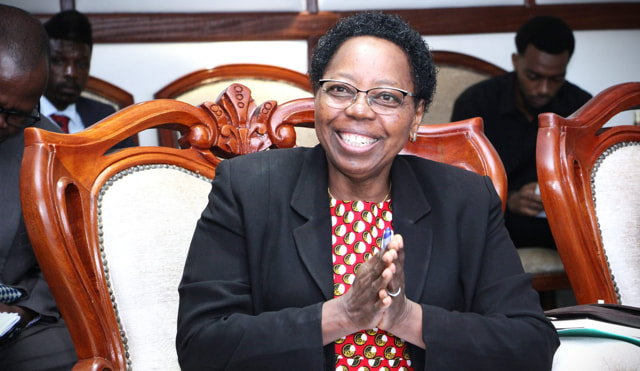STATEMENT ON OBSERVANCE OF THE WORLD ELDER ABUSE AWARENESS DAY 2024
The National Gender and Equality Commission (NGEC) joins older members of society in Kenya and the world at large in observing World Elder Abuse Awareness Day (WEAAD), celebrated every June 15. Established by the United Nations General Assembly in 2011, WEAAD serves as an important reminder of our shared responsibility to protect and uphold the rights and dignity of older persons. The 2024 theme is: "Spotlight on Older Persons in Emergencies”.
The increasing frequency and intensity of natural disasters and other crises, compounded by a rising ageing population, underscore the need to look at the intersection between older persons, and emergencies. The World Health Organization (WHO) estimates that globally over 1 billion people are age 60 and above, a figure projected to double by 2050. In Kenya, 6% of the total population is categorized as older members of society[1]. According to the National Council for Population and Development, the population of older persons increased by about 41% from 1,943,715 in 2009 to 2,740,040 in 2019. This increase in the ageing population presents unique challenges and opportunities in emergency preparedness, response, and recovery.
Emergencies, whether natural disasters, health pandemics, or conflict situations, disproportionately affect older members of society and by extension special interest groups. Older persons represent a high-risk group due to a combination of physical, social, and economic factors. Older persons face barriers to accessing essential services, healthcare, and support systems, which often lead to isolation and insecurity. During such times, the risk of abuse, neglect, and exploitation increases. The Older persons are custodians of knowledge on preparedness, mitigation, and prevention of critical measures against emergencies. However, they are often overlooked and not included in disaster preparedness and response planning, this sometimes leads to strategies that do not fully address their needs.
Kenya has recognized the vulnerability of Older persons in emergencies and put in efforts to address the challenges faced by them through legislative and programmatic measures. For example, Article 57 of the Constitution of Kenya, specifically mandates the State to ensure the rights of older persons, including their right to receive reasonable care and assistance from their family and the State. The National Policy on Older Persons and Ageing (2018) provides a framework for the protection, welfare, and rights of older persons, emphasizing the need for their inclusion in disaster preparedness and response plans. However, significant gaps remain that need to be addressed to ensure the safety and well-being of older individuals during such crises. The recent flooding situation in Kenya is an example of the devastating impacts of emergencies on older persons.
As we mark this day, the National Gender and Equality Commission invites the Government and all stakeholders to consider the following:
- Ensure continual inclusive emergency planning and preparedness by integrating the specific needs and perspectives of older persons into all national and local emergency planning processes
- Ensure accessible communication materials are tailored to older persons, considering among others sensory impairments and comprehension inabilities resultant from aging.
- Ensure that healthcare facilities are equipped to provide continuous care for chronic conditions during emergencies, including access to necessary medications and medical equipment.
- Foster and support community networks that can provide timely assistance and social support to older persons during emergencies.
- Encourage intergenerational programs that build solidarity and mutual support between younger and older community members.
- Closely collaborate with families to ensure economic support and housing security for older persons
- Enact and enforce policies that mandate the inclusion of older persons in emergency planning and response efforts.
- Ensure accountability mechanisms are in place to monitor and evaluate the effectiveness of emergency responses in addressing the needs of older adults.
The Commission commends the ongoing efforts to develop the National Social Protection Policy 2024 and the Older Persons Bill 2024. We urge the National Assembly and responsible agencies to fast-track the enactment of the Older Persons Bill 2024, which operationalizes Article 57 of the Constitution of Kenya, 2010. We support member states in championing a UN Convention on the Rights of Older People. Further, the NGEC lauds the efforts of County Governments in promoting the welfare and dignity of older members of society through various innovative programs. We urge you to ensure that older persons are central to the counties' development plans and priorities.
Let us remember that the measure of progress on development for any society is simply based on how it treats its most vulnerable members. The Commission calls upon all stakeholders to prioritize the rights and well-being of older persons in emergency preparedness, response, and recovery efforts. All must ensure older members of society are not left behind or neglected in times of need.
The National Gender and Equality Commission remains committed to promoting and protecting the rights of older members of society. Let us work together to create a safer, more resilient society that respects and protects the rights of all older persons.
Happy World Elder Abuse Awareness Day!
Thank You.
SIGNED
Dr. Joyce M. Mutinda PhD, EBS
Chairperson
[1] Kenya National Bureau of Statistics (KNBS) 2019; Kenya National Population and Housing Census


Comments